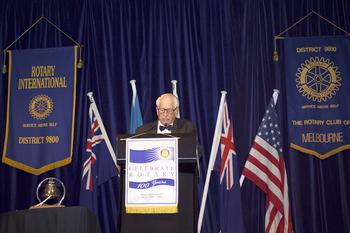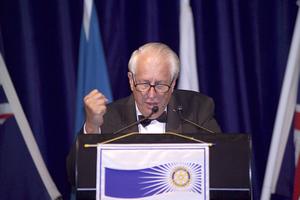|
 Keynote Speech By Sir Gustav Nossal AC CBE to the Centenary Dinner of Rotary Club Of Melbourne Inc on Wednesday, 23rd February 2005. Keynote Speech By Sir Gustav Nossal AC CBE to the Centenary Dinner of Rotary Club Of Melbourne Inc on Wednesday, 23rd February 2005.
Heartiest congratulations on reaching this signal milestone - 100 years of Rotary - a Centenary worthy of the highest commendation and unrestrained celebration.
During a long life of advocacy for medical research and public health, I have lost count of the number of Rotary talks I have given, but on every single occasion I have been impressed with the range of imaginative good causes receiving support and with the commitment of busy Rotarians volunteering their time, their hospitality and frequently quite substantial resources to these diverse worthwhile endeavours. You will probably not be surprised to hear that I have chosen tonight to focus on the biggest, the most international and arguably the toughest of all Rotary programmers, namely the Folio Plus Campaign.
There has only been one occasion in history when a deadly scourge has been globally eradicated. I refer, of course, to smallpox, and isn't it a sad reflection on our world that now, a quarter of a century after the WHO'S smallpox eradication triumph, the smallpox virus heads the list of pathogens in the armoury of biological warfare terrorists, for the simple reason that no one under 30 is immune to it. Some countries are therefore stockpiling a huge number of doses of smallpox vaccine.
The Rotary Interational-WHO Polio Plus programme was designed as an encore. Let's get rid of infantile paralysis from the world once and for all. On this occasion, we had the advantage of a vaccine that could be given by mouth, but the disadvantage that in third world conditions of nutrition and hygiene, several doses of the Sabin live attenuated vaccine were required to induce solid immunity. One innovation which centrally involved millions of Rotary-inspired volunteers was the so-called National Immunisation Days or NIDs. Using the mass media, the support of high public figures and community leaders, all children under 5 in a country are lined up and given the polio drops on a single given day. At least two NIDs, a month apart are encouraged. This policy reaches many children whose parents neglected routine infant immunization. The policy worked so well that at the end of 2003 only six countries in the world had any cases of infantile paralysis and only three, namely-Nigeria, India and Pakistan, reported substantial numbers. Alas, in that year, Nigeria essentially ceased immunization because of unfounded fears concerning vaccine safety. As a result, polio nourished and cases were imported into 12 neighbouring Central African countries which had previously been polio-tree, fortunately, by mid-2004, Nigeria changed course. Let me now report to you how WHO and Rotary International responded.
On 31 July, 2004, Nigeria launches its largest ever polio campaign. Tens of thousands of traditional and religious leaders, teachers, parents and Rotarians join nurses and other health workers to hand-deliver the vaccine. Travelling on foot, horseback, bicycle, boat or whatever means possible, this benevolent army of volunteers covered half of the African continent - an area larger than Western Europe over just four days. Battling stifling humidity, temperatures upward of 40° and in some places torrential downpours, the vaccinators collectively carried more than 100 million doses of vaccine in iced vaccine-carriers containing over three million ice-packs. Dramatic challenges were overcome during the activity. In parts of Liberia and Sierra Leone, vaccine had to be airlifted by helicopters to otherwise inaccessible parts of these countries due to civil conflict. This eradication effort has truly united all levels of civil society in Africa.
Clearly the mammoth task of global polio eradication is not yet done and we must dedicate ourselves to its completion over the next couple of years. If we do succeed, Rotary can pride itself on 20 years work in 200 countries, involving (wait for it) 20 million volunteers who together immunized two billion children.
Next, I wish to mention briefly another dynamic force in international public health, namely the Bill and Melinda Gates Foundation. Through its extraordinary generosity involving US$2 billion, it has revitalized the infant immunization programme of WHO and UNICEF, targeting not only the six standard vaccines but introducing newer and more expensive vaccines such as those against hepatitis and meningitis. The now five-year-old Global Alliance for Vaccines and Immunization has captured the imagination of the world and has engendered similar global funds for HIV/AIDS, malaria and improved nutrition. Best of all, quite recently sovereign governments, such as the United Kingdom, Norway and Germany have committed themselves to a new and much larger instrument of foreign aid.
I refer to the proposed International Finance Facility. This long-mooted proposal is based on the rich countries selling bonds in the international capital markets, based on legally binding, long-term donor country commitments. In this way, substantial development funds become available immediately and lead to predictable and stable aid flows. Eventual redemption of the bonds is facilitated through more rapid development aiding global trade and overall wealth.
 The most passionate proponent of this scheme is UK Chancellor of the Exchequer Gordon Brown. And yes, you've guessed it, the International Finance Facility for Immunization is first cab off the rank. It will raise US$4 billion for the Global Alliance for Vaccines and Immunization to be spent over ten years. In launching the British pledge of $1.8 billion of this total at the World Economic Forum in Davos a month ago, Gordon Brown waxed quite poetic. He said: "We must bridge the gap between promises and reality. Let us recall the century-old phrase: the arc of the moral universe is long, but it does bend towards justice." The most passionate proponent of this scheme is UK Chancellor of the Exchequer Gordon Brown. And yes, you've guessed it, the International Finance Facility for Immunization is first cab off the rank. It will raise US$4 billion for the Global Alliance for Vaccines and Immunization to be spent over ten years. In launching the British pledge of $1.8 billion of this total at the World Economic Forum in Davos a month ago, Gordon Brown waxed quite poetic. He said: "We must bridge the gap between promises and reality. Let us recall the century-old phrase: the arc of the moral universe is long, but it does bend towards justice."
Of course, vaccines are not the only tools we must bring to bear on the health situation in developing countries. The Global Fund to Fight AIDS, Tuberculosis and Malaria relies both on prescription pharmaceuticals and on a variety of public health measures. For example, insecticide-impregnated bednets, if used consistently, can halve the number of deaths from malaria in children in African countries. With regard to nutrition, micronutrients such as vitamin A, iron and iodine represent incredibly cheap and straightforward tools which need to be deployed more widely.
Equally obviously, health is not the only field where improvements are necessary. The President of The World Bank, Mr James D Wolfensohn, during his visit to Melbourne last year, also placed heavy emphasis on key millennium development goals such as poverty reduction and education. He reminded us that progress would depend on the strengthening of legal, financial and above all governance structures in the third world. He had some picturesque things to say about global priorities, Each year, the world spends one trillion dollars on defence, 300 to 350 billion dollars on agricultural subsidies and tariffs largely designed to keep third world products out of first world markets, but on international development assistance, only 50 to 60 billion dollars. He concluded that a person visiting us from Mars would think we were all quite mad!
Rotarians are idealists but at the same time very practical. They would therefore be sympathetic to a somewhat awkward point I now wish to make. There are selfish as well as humanitarian reasons why we should seek greater social justice in the world. Since 11 September, 2001, we have had repeated reminders of the havoc that disaffected minorities can wreak. Of course the sources and causes of ancient hatreds are very complex and terrorism is certainly not directly attributable to poverty and ignorance. Nevertheless, in a world where even remote villages have access to television and sometimes even the internet, the gross disparities in living standards and opportunities must breed resentment among the disadvantaged. I will turn to two very different authorities to buttress my argument.
Colin Powell, then US Secretary of State, said in December 2004: "What poverty does is breed frustration and resentment which ideological entrepreneurs can turn into support for terrorism... So we can't win the war on terrorism unless we get at the roots of poverty, which are social and political as well as economic in nature."
And a year earlier, Pope John Paul II linked peace to justice in the following words: "Hunger and malnutrition, aggravated by growing poverty, represent a grave threat to the peaceful coexistence of peoples and nations. We will not facilitate the peace process by allowing, with guilty indifference, injustice to prosper on our planet. Poor countries often become places of desperation, forgers of violence. Peace is an enterprise of justice. At the root of war, and in particular of terrorism, we find serious grievances and injustices."
Over the last few years I have dared to describe the new engagement with the developing countries which I believe the world requires as a kind of Global Marshall Plan. You will recall that it was the largely US-financed Marshall Plan which brilliantly rebuilt war-shattered Europe, and especially Germany, after World War II. At its height, the Marshall Plan consumed 4.5 of US GDP. There are so many differences that the analogy is a bit contrived, so imagine my surprise when Chancellor Gordon Brown used those very words, a Global Marshall Plan, in his address in Davos. Given a quarter of a century, we can eliminate abject poverty, we can teach must kids to read, we can bring primary health care to the urban slums and the rural poor, if only we have the will. The Indian Ocean tsunami, and perhaps particularly the Australian response, shows what people are capable of. Rotarians think globally, Rotarians act locally, Rotarians are embedded in their communities. They have a great role to play as the 21st century, the knowledge century and perhaps also the compassion century, unfolds. Rotarians, in your second century, don't just keep up the good work. Expand and deepen your global mission. I should like to finish with some words from the great Irish poet, Nobel Laureate Seamus Heaney. In commenting on Nelson Mandela's release from goal he wrote: "A further shore is reachable from here. Once in a lifetime justice can rise up and hope and history rhyme."
|